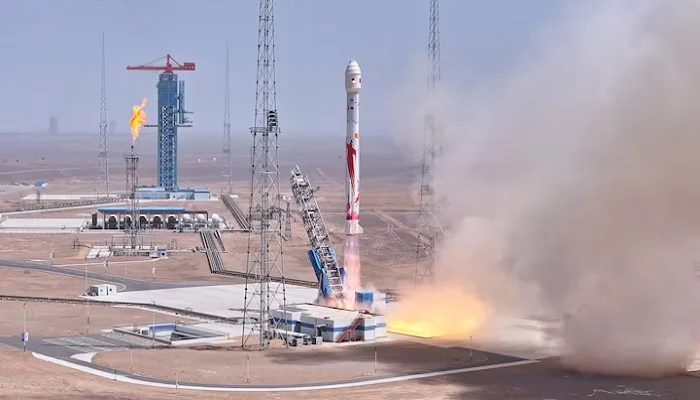China’s private startup, LandSpace Technology, successfully launched a new methane-powered rocket on Saturday, carrying six satellites into orbit. This move underscores the company’s increasing focus on methane, a cheaper and cleaner fuel they hope will aid in the development of reusable rockets.
The Zhuque-2E Y2 carrier rocket lifted off at 12:12 p.m. (0412 GMT) from the Jiuquan Satellite Launch Center in northwest China, marking the fifth flight in the Zhuque-2 series, according to a company statement.
Beijing-based LandSpace achieved a global first in July 2023 by launching a methane-liquid oxygen rocket, outpacing US competitors such as Elon Musk’s SpaceX and Jeff Bezos’ Blue Origin.
Interest in methane-fueled launch vehicles has grown significantly in recent years due to methane’s perceived advantages: it is less polluting, safer, and more cost-effective compared to commonly used hydrocarbon fuels, and it serves as a suitable propellant for reusable rockets.
LandSpace has increased the rocket’s payload capacity, reflecting the rising demand within China’s expanding commercial space industry. This growth is driven by increasing competition to establish satellite constellations as an alternative to Musk’s Starlink.
While LandSpace’s initial successful methane-powered launch did not carry any operational satellites, its second launch in December 2023 successfully placed three satellites into orbit.
Saturday’s launch successfully deployed six satellites, primarily developed by the Chinese firm Spacety, also known as Changsha Tianyi Space Science and Technology Research Institute.
Li Xiaoming, the institute’s vice-president, stated in a livestream hosted by LandSpace prior to the launch that the payload included a radar satellite, two multispectral satellites, and three satellites dedicated to scientific experiments, with weights ranging from 20 kg to 300 kg (44-660 pounds).
Reusable Rockets on the Horizon
Li explained that the three research-focused satellites will contribute to China’s deep-space exploration ambitions, while the two multispectral satellites will be dedicated to environmental monitoring and mineral deposit identification, respectively.
He added that the radar satellite is an all-weather Earth-observation satellite capable of producing images during both day and night and can also penetrate clouds and rain.
Li further noted that the radar satellite “can also pick up small, millimetre-level shifts in the surface, a capability that makes it extremely useful across urban development, transportation and energy infrastructure monitoring.”
Spacety was sanctioned by the US Treasury Department in January 2023 for allegedly providing a Russian company with radar satellite imagery over Ukraine, which the US claimed was used to facilitate combat operations by the Russian mercenary group Wagner in Ukraine.
Spacety has denied these allegations, stating that it has never engaged in any business dealings with the entities mentioned by the Treasury Department and that its products and services are solely intended for commercial and civilian applications.
Reusable rockets, pioneered by SpaceX, have demonstrated their potential to reduce costs for launch vehicles and space transportation. LandSpace founder and CEO Zhang Changwu has announced that the company has begun developing reusable rockets and anticipates conducting a test launch in the second half of 2025.
The latest model in LandSpace’s Zhuque-2 series incorporates technical improvements designed to support the company’s goal of launching a reusable rocket.
Saturday’s launch marked LandSpace’s first deployment of a propulsion method involving the chilling of both liquid oxygen and methane below their boiling points, resulting in increased thrust.
Chinese commercial space firms have rapidly entered the sector since 2014, following the government’s decision to permit private investment in the industry. LandSpace was among the earliest and best-funded companies to join this growing field.
Founded in 2015, LandSpace has secured funding from various investors, including venture capital firm HongShan (formerly known as Sequoia Capital China), the investment arm of Chinese property developer Country Garden, and the state-backed China SME Development Fund.
Chinese corporate databases indicate that LandSpace raised 900 million yuan ($120 million) in December from a state-owned fund focused on advanced manufacturing, and an additional 1.2 billion yuan ($170 million) in 2020.



